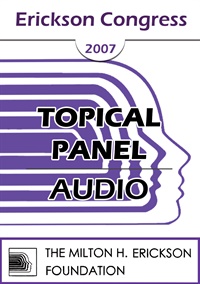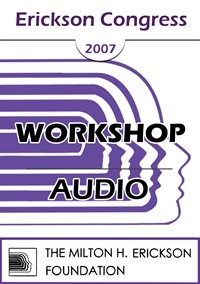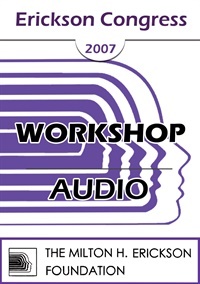
- Average Rating:
- Not yet rated
- Topic Areas:
- Short Courses | Children and Adolescent Therapy | Ericksonian Hypnosis and Therapy Techniques | Self-Esteem
- Categories:
- Erickson Congress | Erickson Congress 2007
- Faculty:
- Carme Timoneda-Gallart
- Duration:
- 1:15:58
- Format:
- Audio Only
- Original Program Date:
- Dec 07, 2007
- Short Description:
- In this workshop, we will focus on the importance of self-esteem as an explanation for the problematic behavior of children and teenagers and discuss recent neurological research. We will show cases to apply some Ericksonian solutions in children who share negative self- esteem for their problematic behavior.
- Price:
- $15.00 - Base Price

- Average Rating:
- Not yet rated
- Topic Areas:
- Short Courses | Children and Adolescent Therapy | Ericksonian Hypnosis and Therapy Techniques | Ericksonian Psychotherapy | Psychotherapy | Utilization | Tailoring
- Categories:
- Erickson Congress | Erickson Congress 2007
- Faculty:
- Maria Escalante de Smith, MA
- Duration:
- 1:18:55
- Format:
- Audio Only
- Original Program Date:
- Dec 07, 2007
- Short Description:
- Ericksonian psychotherapy emphasizes the utilization of our resources. When I treat children with enuresis, I focus on resources and keep in mind that Ericksonian interventions should be brief because children may get tired of being in therapy for too long. Techniques tailored to a child and examples of inductions such as eye fixation utilizing toys will be presented. I will emphasize how to make several brief interventions quickly while utilizing "non human co-therapists" during home assignments, and the combination of conversational trance with tasks.
- Price:
- $15.00 - Base Price

- Average Rating:
- Not yet rated
- Topic Areas:
- Short Courses | Ericksonian Hypnosis and Therapy Techniques | Utilization | Autism | Children and Adolescent Therapy
- Categories:
- Erickson Congress | Erickson Congress 2007
- Faculty:
- Diane Yapko, MA
- Duration:
- 1:19:00
- Format:
- Audio Only
- Original Program Date:
- Dec 07, 2007
- Short Description:
- This workshop focuses on the practical applications of Milton Erickson's utilization approach and applications of hypnosis in working with children diagnosed with Asperger's and other high functioning autism spectrum disorders. There is evidence to suggest that more concrete and strategic applications of Erickson's utilization approach may better serve us when we treat ASD and other individuals with language, processing and attention disorders.
- Price:
- $15.00 - Base Price

- Average Rating:
- Not yet rated
- Topic Areas:
- Short Courses | Children and Adolescent Therapy | Ericksonian Hypnosis and Therapy Techniques | Family Therapy | Utilization | Relationships
- Categories:
- Erickson Congress | Erickson Congress 2007
- Faculty:
- Ramona Garnier, PhD
- Duration:
- 1:19:00
- Format:
- Audio Only
- Original Program Date:
- Dec 07, 2007
- Short Description:
- This presentation addresses the issues of teen anger and "acting out" from Erickson's utilization approach to treatment. Interventions psychotherapists can integrate into family therapy enhancing parent capabilities and encouraging improved relating to their teens will be presented. An experiential exercise will be provided helping attendees integrate hypnotic and strategic approaches into their treatments.
- Price:
- $15.00 - Base Price

- Average Rating:
- Not yet rated
- Topic Areas:
- Short Courses | Anxiety | Children and Adolescent Therapy | Ericksonian Hypnosis and Therapy Techniques
- Categories:
- Erickson Congress | Erickson Congress 2007
- Faculty:
- Lynn Lyons, LICSW
- Duration:
- 1:19:39
- Format:
- Audio Only
- Original Program Date:
- Dec 07, 2007
- Short Description:
- Excessive anxiety in childhood is a significant predictor of eventual comorbid depression and other conditions. This presentation will identify the cognitive processes and coping strategies that help create a cycle of anxiety, psychological isolation and depression in anxious children and families. Attention will be given to the development of specific, empirically supported Ericksonian strategies which can help shift the anxious individual and family toward malleability, creativity and adaptability.
- Price:
- $15.00 - Base Price

- Average Rating:
- Not yet rated
- Topic Areas:
- Short Courses | Ericksonian Hypnosis and Therapy Techniques | Hypnosis | Utilization | Children and Adolescent Therapy | Trance
- Categories:
- Erickson Congress | Erickson Congress 2007
- Faculty:
- Peg LeBlanc, MA
- Duration:
- 1:19:27
- Format:
- Audio Only
- Original Program Date:
- Dec 07, 2007
- Short Description:
- Children and their families face many challenges that, depending on how they are managed, will have long-lasting influence either for better or worse. In this presentation, we will focus on some of these challenges and will describe some helpful interventions derived from Ericksonian approaches that have been successfully applied in a multicultural school setting.
- Price:
- $15.00 - Base Price

- Average Rating:
- Not yet rated
- Topic Areas:
- Short Courses | Children and Adolescent Therapy | Humor | Therapeutic Relationship
- Categories:
- Erickson Congress | Erickson Congress 2007
- Faculty:
- Bruce L.M. Tanenbaum, MD
- Duration:
- 1:06:04
- Format:
- Audio Only
- Original Program Date:
- Dec 07, 2007
- Short Description:
- Underachieving adolescents present a significant challenge to the therapist. Traditional therapies are often slow and may be ineffective and frustrating both to the therapist and the client. Provocative Therapy is an active humor-based therapy that often elicits significant changes quickly. Case studies will help illustrate principles and techniques therapist can use with adolescents and other client who may present a challenge.
- Price:
- $15.00 - Base Price

- Average Rating:
- Not yet rated
- Topic Areas:
- Topical Panels | Children and Adolescent Therapy
- Categories:
- Erickson Congress | Erickson Congress 2007
- Faculty:
- Danie Beaulieu, PhD | Maria Escalante de Smith, MA | John Edgette, PsyD | Susy Signer-Fischer, Lic. Phil. Psych
- Duration:
- 59:08
- Format:
- Audio Only
- Original Program Date:
- Dec 08, 2007
- Short Description:
- IC07 Topical Panel 10 - Therapy with Children & Adolescents - Danie Beaulieu, Ph.D., Maria Escalante Cortina, D.D.S., John Edgette, Psy.D., Susy Signer-Fischer, Lic. Phil.
- Price:
- $15.00 - Base Price

- Average Rating:
- Not yet rated
- Topic Areas:
- Workshops | Addiction | Children and Adolescent Therapy | Depression | Eating Disorders | Ericksonian Hypnosis and Therapy Techniques | Hypnosis | Metaphors | Phobia | Trauma | Trance
- Categories:
- Erickson Congress | Erickson Congress 2007
- Faculty:
- Cheryl Bell-Gadsby, M.A., R.C.C.
- Duration:
- 1:54:20
- Format:
- Audio Only
- Original Program Date:
- Dec 07, 2007
- Short Description:
- This workshop will provide participants with innovative and supportive strength-based interventions to address the unique impact of violence and trauma on adolescent girls. A model for applying Ericksonian hypnosis and metaphor will be presented and practiced. These techniques can be used to facilitate clients in reconnecting to a healthy mind/body state by applying tools for understanding and working with the expressions of trauma such as disordered eating, suicidal ideation, self-harming, addiction, depression, anxiety and phobias in the daily lives and relationships of young women.
- Price:
- $15.00 - Base Price

- Average Rating:
- Not yet rated
- Topic Areas:
- Workshops | Children and Adolescent Therapy | Tailoring | Strategic Therapy
- Categories:
- Erickson Congress | Erickson Congress 2007
- Faculty:
- Janet Sasson Edgette, PsyD
- Duration:
- 1:52:06
- Format:
- Audio Only
- Original Program Date:
- Dec 07, 2007
- Short Description:
- Few therapy approaches were designed specifically with adolescents in mind. Teenagers often describe therapy as irrelevant and boring. This approach replaces an emphasis on feelings, confidentiality, and non-judgmental support with a focus on therapist credibility, client accountability, and un-affected conversation – factors that are more affecting to these kids, many of whom never asked for our help in the first place. Participants learn how to establish themselves as credible figures to their teen clients, boldly hold those clients accountable for their choices, and build compelling conversations sentence by sentence that have genuine meaning and striking impact.
- Price:
- $15.00 - Base Price
Please wait ...

